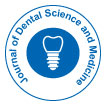当社グループは 3,000 以上の世界的なカンファレンスシリーズ 米国、ヨーロッパ、世界中で毎年イベントが開催されます。 1,000 のより科学的な学会からの支援を受けたアジア および 700 以上の オープン アクセスを発行ジャーナルには 50,000 人以上の著名人が掲載されており、科学者が編集委員として名高い
。オープンアクセスジャーナルはより多くの読者と引用を獲得
700 ジャーナル と 15,000,000 人の読者 各ジャーナルは 25,000 人以上の読者を獲得
インデックス付き
- レフシーク
- ハムダード大学
- エブスコ アリゾナ州
- ICMJE
役立つリンク
オープンアクセスジャーナル
このページをシェアする
抽象的な
Dental Implant Failure as a Risk Factor for Selective Serotonin Reuptake Inhibitors: A Study of Clinical History
María Quintanilla
Antidepressants, particularly selective serotonin reuptake inhibitors (SSRIs), have seen an exponential rise in popularity in recent decades in Europe and the United States. This retrospective study wanted to find out if there was a link between taking SSRIs and dental implant (DI) failure or survival, and secondarily, how other systemic and local factors affected it. The STROBE (Strengthening the Reporting of Observational Studies in Epidemiology) observational study guidelines were followed in this retrospective cohort study. 573 DIs were given to 170 patients altogether. The reported failure rate for DI was 6.11 percent. 18.31 percent of these failed in patients who were prescribed SSRIs, while 4.38 percent failed in patients who were not. In particular, the multivariate analysis revealed 3.70 times higher adjusted risk and a 4.53 times higher hazard ratio for DI failure when these drugs were used. These patients also had a lower rate of DI survival at 90 months compared to those who did not take them. With the restrictions of the current review, it tends to be certified that there is a connection between the admission of SSRIs and DI disappointment, as well as a lower endurance rate in these patients.

 English
English  Spanish
Spanish  Chinese
Chinese  Russian
Russian  German
German  French
French  Portuguese
Portuguese  Hindi
Hindi